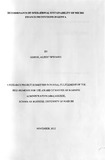| dc.contributor.author | Gibson, Albert B | |
| dc.date.accessioned | 2013-02-22T08:55:27Z | |
| dc.date.issued | 2012-11 | |
| dc.identifier.citation | MBA Thesis | en |
| dc.identifier.uri | http://erepository.uonbi.ac.ke:8080/xmlui/handle/123456789/10719 | |
| dc.description | Determinants of operational sustainability of micro finance institutions in Kenya | en |
| dc.description.abstract | Many people in developing countries have been given access to formal financial services through micro-finance programs. Nevertheless, millions of potential clients still remain unserved and the demand for financial services far exceeds the currently available supply. Given significant capital constraints, expansion of micro-finance programs remains a formidable challenge facing the micro-finance industry. Moreover, it is observed that micro-finance organizations have had various degrees of sustainability. One such sustainability is the financial sustainability. Financial sustainability has been defined by various researchers differently. As such there is no clear cut definition of the word financial sustainability. Therefore this paper attempts to find out the factors which affect the operations self- sufficiency and financial sustainability and thereafter propose a more comprehensive and representative model for financial sustainability and create an index to observe the financial performance of micro-finance sector. The financial data of micro-finance institutions from Kenya suggests that the capital / asset ratio, operating expenses / loan portfolio and portfolio at risk > 30 days are the main factors which affect the sustainability of micro-finance institutions.
The study was guided by the main objective which was to establish the factors that determines the operational sustainability of micro finance institutions in Kenya. The study utilized a descriptive research design and it targeted 30 micro-finance institutions (MFIs) listed from the Association of Micro-finance Institutions (AMFI) in Kenya, which provided financial services to low income people in Kenya. The data for the study was drawn from a database of audited financial statements of MFIs in Kenya. The data collected from the financial statements included capital structure variables which include debt, equity, total assets, etc. A multiple regression model was used to analyze data collected.
It can be observed that the factors that affect the operations and financial sustainability are Capital/ asset ratio and Operating expenses/Loan Portfolio. Therefore these indicators have been included along with Operational Self Sufficiency to create Sustainability index. This model of operational self-sufficiency and financial sustainability Index for microfinance institutions is more comprehensive. With the help of this model, the MFIs in Kenya can quantify the level of operations and financial sustainability. This model can also be used to create a sustainability index for various countries and help the regulator identifying the strong and weak areas of the sector. In addition, the existence of new model is also expected to facilitate MFIs to access to capital markets. Having access to sustainability information may reduce some of the transaction uncertainty. This model may be considered as one more step in the process of the emergence of the micro-finance standards. | en |
| dc.description.sponsorship | University of Nairobi | en |
| dc.language.iso | en | en |
| dc.subject | Operational sustainability | en |
| dc.subject | Micro Finance Institutions | en |
| dc.subject | Kenya | en |
| dc.title | Determinants of operational sustainability of micro finance institutions in Kenya | en |
| dc.type | Thesis | en |
| local.publisher | School of Business, University of Nairobi | en |

